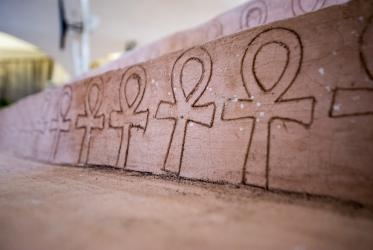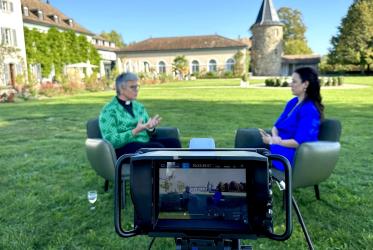Between morning and evening prayers, the study groups evaluated seven years of common ecumenical theological work in the areas of ecclesiology, ethics, and contemporary challenges to mission, and prepared the ground for the future work of the commission.
“The commission reviewed and improved its plans for the commemoration of the 1,700th anniversary of the Council of Nicaea, a unique opportunity to help contemporary churches to grow in the common understanding of the apostolic faith, an essential requirement for Christian unity,” explained Rev. Dr Odair Pedroso Mateus, WCC’s acting deputy general secretary and director of its Faith and Order Commission.
The first study group—pilgrimage—reflected on the pilgrimage rooted in the call for unity. Three documents—“Come and See. A Theological Invitation to the Pilgrimage of Justice and Peace,” “Cultivate and Care. An Ecumenical Theology of Justice for and within Creation,” and “Love and Witness. Proclaiming the Peace of the Lord Jesus Christ in a Religiously Plural World” – adopted a new methodology of writing ecumenical texts. The ecumenicity appeared not in the (divisive) object of the study, but in the ecumenical engagement with topics other than the ones attached to classical ecumenism. The pilgrimage paradigm informed the approach and the work. These three texts attempt to deal with mission today. There is a practical dimension in their scope.
The Nicaea Planning Group underlined that the commemoration of the 1,700th anniversary of the first ecumenical council (Nicaea 325) is a unique opportunity for the Commission on Faith and Order to serve the churches as they seek to live the apostolic faith together today. There will be a series of events leading up to and throughout 2025, including a hybrid world conference (28 August-3 September 2025). The work of the Nicaea Planning Group is divided in three main themes: faith, unity, and mission.
The second study group—ecclesiology—explored how the 2015-2022 septennium has been a period of reception of “The Church: Towards a Common Vision” by churches around the world, as well as a period in which the multilateral ecumenical dialogue on ecclesiology was broadened to integrate multiple voices of world Christianity.
Upon the publication of “The Church: Towards a Common Vision” in 2013, Faith and Order invited the churches to send official responses to the document. A total of 78 responses came from around the world, welcoming the text, offering valuable contributions, and highlighting important insights and guidance for future work.
The third study group—moral discernment—was pleased to see that its work has been welcomed widely within the WCC, not least at the WCC 11th Assembly. There is now momentum behind this area of work. The methodology developed by the study group, “learning from traditions” and “learning from history,” has been well received. The study document “Churches and Moral Discernment. Facilitating Dialogue to Build koinonia” offers a tool that is being used by churches to analyse disagreement and constructively work towards understanding. Study group members shared that whenever they presented the tool in church or academic settings, there is often an “aha” moment, when participants look at the dynamic of continuity and change in moral discernment. The study group proposes that the reception process should involve a feedback loop of testing, evaluating, and developing the tool.
The meeting also included the release of the Faith and Order paper “Towards a Global Vision of the Church Volume I: Explorations on Global Christianity and Ecclesiology, Faith and Order.”
The meeting concluded with a celebration of the leadership of Pedroso Mateus, who is retiring.
The next WCC Commission on Faith and Order meeting will take place online in April 2023.






